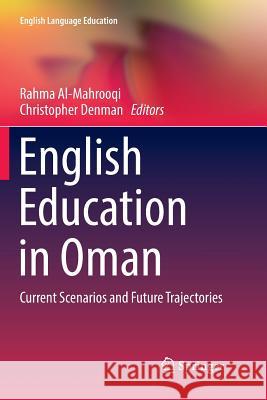English Education in Oman: Current Scenarios and Future Trajectories » książka
topmenu
English Education in Oman: Current Scenarios and Future Trajectories
ISBN-13: 9789811343742 / Angielski / Miękka / 2019 / 322 str.
Kategorie:
Kategorie BISAC:
Wydawca:
Springer
Seria wydawnicza:
Język:
Angielski
ISBN-13:
9789811343742
Rok wydania:
2019
Wydanie:
Softcover Repri
Numer serii:
000520362
Ilość stron:
322
Waga:
0.47 kg
Wymiary:
23.39 x 15.6 x 1.78
Oprawa:
Miękka
Wolumenów:
01
Dodatkowe informacje:
Wydanie ilustrowane











